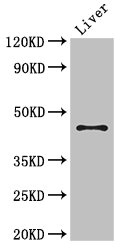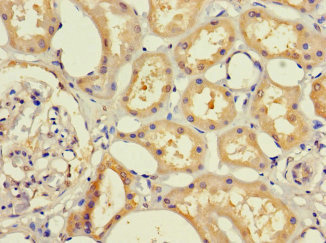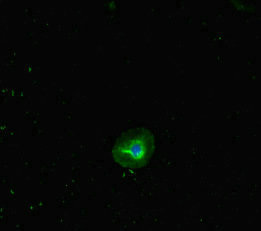RHD Antibody
-
货号:CSB-PA019677LA01HU
-
规格:¥440
-
促销:
-
图片:
-
Western Blot
Positive WB detected in: Mouse liver tissue
All lanes: RHD antibody at 3μg/ml
Secondary
Goat polyclonal to rabbit IgG at 1/50000 dilution
Predicted band size: 46, 35, 54, 44, 42 kDa
Observed band size: 46 kDa -
Immunohistochemistry of paraffin-embedded human kidney tissue using CSB-PA019677LA01HU at dilution of 1:100
-
Immunofluorescent analysis of A549 cells using CSB-PA019677LA01HU at dilution of 1:100 and Alexa Fluor 488-congugated AffiniPure Goat Anti-Rabbit IgG(H+L)
-
-
其他:
产品详情
-
产品描述:
The immunization of rabbits with the recombinant human RHD protein (32-76AA) and final purification from rabbit antiserum by protein G causes the creation of the anti-RHD antibody. This RHD antibody is a polyclonal antibody and occurs as an unconjugated IgG. Its purity is greater than 95%. It is reactive with human and mouse RHD protein, which is the Rh factor antigen of the Rh blood group system and is found on the surface of red blood cells. And this anti-RHD antibody has been validated for use in ELISA, WB, IF, and IHC applications.
-
产品名称:Rabbit anti-Homo sapiens (Human) RHD Polyclonal antibody
-
Uniprot No.:Q02161
-
基因名:
-
别名:RHD; Blood group Rh(D polypeptide; RHXIII; Rh polypeptide 2; RhPII; Rhesus D antigen; CD antigen CD240D
-
宿主:Rabbit
-
反应种属:Human, Mouse
-
免疫原:Recombinant Human Blood group Rh(D) polypeptide protein (32-76AA)
-
免疫原种属:Homo sapiens (Human)
-
标记方式:Non-conjugated
本页面中的产品,RHD Antibody (CSB-PA019677LA01HU),的标记方式是Non-conjugated。对于RHD Antibody,我们还提供其他标记。见下表:
-
克隆类型:Polyclonal
-
抗体亚型:IgG
-
纯化方式:>95%, Protein G purified
-
浓度:It differs from different batches. Please contact us to confirm it.
-
保存缓冲液:Preservative: 0.03% Proclin 300
Constituents: 50% Glycerol, 0.01M PBS, PH 7.4 -
产品提供形式:Liquid
-
应用范围:ELISA, WB, IHC, IF
-
推荐稀释比:
Application Recommended Dilution WB 1:2000-1:5000 IHC 1:20-1:200 IF 1:50-1:200 -
Protocols:
-
储存条件:Upon receipt, store at -20°C or -80°C. Avoid repeated freeze.
-
货期:Basically, we can dispatch the products out in 1-3 working days after receiving your orders. Delivery time maybe differs from different purchasing way or location, please kindly consult your local distributors for specific delivery time.
相关产品
靶点详情
-
功能:May be part of an oligomeric complex which is likely to have a transport or channel function in the erythrocyte membrane.
-
基因功能参考文献:
- 4 novel RHD alleles, each characterized by a single nucleotide substitution were identified. RHD*67T, RHD*173T, and RHD*579C give rise to a weak D phenotypical expression. Their corresponding amino acid changes are predicted to be located in the membrane-spanning or intracellular domains of the RhD protein. RHD*482G is the 4th substitution. PMID: 29052223
- Extensive studies show that the RHD*1227A is the most prevalent DEL allele in East Asian populations and may have confounded the initial molecular studies. PMID: 29214630
- The most prevalent DEL allele was RHD*DEL1 (c.1227G>A), which is proven to be immunogenic. A high frequency of RHD*Psi was detected in the donors with nondeleted RHD alleles (31%), far superior to the frequency of RHD variant alleles (15.5%). PMID: 29193119
- Absence of the whole RHD gene is common among RhD negative blood donors from Qingdao region, and there are rich genetic polymorphisms for this locus PMID: 29188626
- The RHD 1227G>A mutation contributes to the molecular basis of Del phenotype in the Taiwanese population. The point mutation results in aberrant frame shift or exon deletion transcripts and generates D protein with weak antigen presenting function. PMID: 26774048
- In this mixed Brazilian population, the most frequent weak D types were 1, 4, 3 and 2 (frequencies of 4.35%, 2.32%, 1.46% and 0.29%, respectively; total of 8.41%) and partial D was found in 2.90% of samples carrying the RHD gene. For samples with inconclusive RhD typing, 53.33% of them presented weak and partial RHD, and 43.75% had concomitantly more than one RHD variant PMID: 27184292
- sequence comparisons revealed high sequence similarity between Patr_RHbeta and Hosa_RHCE, while the chimpanzee Rh gene closest to Hosa_RHD was not Patr_RHa but rather Patr_RHy PMID: 26872772
- Six weak D types in the Russian Federation: the most common type 3 (49.2%) and type 1 (28.6%), type 2 (14.3), type 15 (4.8%), type 4.2 (DAR) (1.6%) and type 6 (1.6%). PMID: 27459619
- The frequency of RhD negative homozygosity in the Cypriot population was estimated to be 7.2%, while the frequencies of RHD hemizygosity and RhD positive homozygosity was calculated to be 39.2 and 53.6%, respectively. PMID: 27036548
- Occurrence of partial RhD alleles in the Tunisian population. PMID: 26482434
- Reduced expression of D antigen is caused not only by missense mutation of the RHD gene, but also by silent mutation that may affect splicing. PMID: 26340140
- Loss of heterozygosity of RhD gene on chromosome 1p in acute myeloid leukemia. PMID: 25495174
- The data indicate that partial DEL women appear at risk of alloimmunization to the D antigen. PMID: 26033335
- Weak D type 4.0 appears to be the most prevalent weak D in our population. However, all samples must be sequenced in order to determine the exact subtype of weak D type 4, since weak D type 4.2 has considerable clinical importance PMID: 25369614
- Paternal RHD zygosity determination in Tunisians: evaluation of three molecular tests. PMID: 24960665
- Serologic findings of RhD alleles in Egyptians and their clinical implications. PMID: 25219636
- Despite the enormous diversity of RHD alleles, first-line weak D genotyping was remarkably informative, allowing for rapid classification of most samples with conspicuous RhD phenotype in Flanders, Belgium. PMID: 25413499
- Splicing is altered in RHD*weak D Type 2 allele, a rare variant most commonly found in Caucasians; RHD including the full-length Exon 9 is transcribed in the presence of the c.1227G>A substitution frequently carried by Asians with DEL phenotype. PMID: 25808592
- Among all donors 89.00% and 10.86% were D-positive and D-negative, respectively, while 0.14% (n=55) of the donors were found to be weak D-positive. PMID: 24960662
- The frequency of D variants detected by IAT allele RHD(M295I) was 1:272 in D negative donors. Obviously, DEL phenotype is more common in some parts of European population than initially thought. PMID: 24556127
- New RHD variant alleles. PMID: 25179760
- Currently, it seems to be difficult to observe any new RHD alleles in the Han Chinese population. D prediction in this population is easier because popular alleles are dominant, accounting for about 99.80% of alleles in D-negative people. PMID: 24333088
- In Han Chinese people with weak D serotyping, 8 weak D and 4 partial D alleles were found. 3 new weak D alleles (RHD weak D 95A, 779G, and 670G) and one new partial D allele (RHD130-132 del TCT) were identified. PMID: 25070883
- DEL/weak D-associated RHD alleles were found in 2.17% of Australian D-, C+ and/or E+ blood donors. PMID: 24894016
- RHD alleles and D antigen density among serologically D- C+ Brazilian blood donors. PMID: 24267268
- In this study, D antigen density on the erythrocyte surface of DEL individuals carrying the RHD1227A allele was extremely low, there being only very few antigenic molecules per cell, but the D antigen epitopes were grossly complete. PMID: 24333082
- The prevalence of D-/RHD+ samples is higher than that observed in Europeans. More than 50% of the RHD alleles found were represented by RHDpsi and RHD-CE-D(s) showing the African contribution to the genetic pool of the admixed population analyzed. PMID: 24819281
- A method of genotyping has been developed in the laboratory. genotyping results of 200 pregnant women have been compared with RH1 phenotype at birth. PMID: 24559796
- We conclude that noninvasive fetal RHD genotyping from maternal blood provides accurate results and suggests its viability as a clinical tool for the management of RhD-negative pregnant women in an admixed population. PMID: 24615044
- Two molecular polymorphisms to detect the (C)ce(s) type 1 haplotype. PMID: 24333080
- This study analyzes the phenotype and frequency of RhD and tetanus toxoid specific memory B cells in limiting dilution culture. PMID: 24965774
- Data indicate that non-invasive prenatal testing of cell-free fetal DNA (cffDNA) in maternal plasma can predict the fetal RhD type in D negative pregnant women. PMID: 24204719
- DIV alleles arose from at least two independent evolutionary events. DIV Type 1.0 with DIVa phenotype belongs to the oldest extant human RHD alleles. DIV Type 2 to Type 5 with DIVb phenotype arose from more recent gene conversions. PMID: 23461862
- RHD*DARA and RHD*DAR2 are the same allele. Furthermore, the alleles RHD*DAR1.2 and RHD*DAR1.3 both exist; however, the silent mutation 957G>A (V319) showed no influence on the RhD phenotype. PMID: 23902153
- All novel weak D types expressed all tested D epitopes. PMID: 23550956
- Only 0.2% of D- Polish donors carry some fragments of the RHD gene; all of them were C or E+. Almost 60% of the detected RHD alleles may be potentially immunogenic when transfused to a D- recipient. PMID: 23634715
- This study is the first to describe weak D types caused by intronic variations near the splice sites in the RHD gene, which is supported by the genotyping results combined with serologic profiles and bioinformatics analysis. PMID: 23216299
- RHD variants were identified in 91.6% of the 430 studied samples. Two of the nine previously undescribed variants, c.335G>T and c.939G>A, were found to cause aberrant mRNA splicing by means of a splicing minigene assay. PMID: 23228153
- Hemizygous RHD subjects demonstrated significantly higher platelet increases and peak platelet counts than homozygous RHD subjects. PMID: 23712954
- The RHD*weak 4.3 allele with markedly reduced antigen D expression was shown to be associated with an altered RHCE gene formation leading to the expression of C(X) and VS. PMID: 22288371
- modulates the influence not only of latent toxoplasmosis, but also of at least two other potentially detrimental factors, age and smoking, on human behavior and physiology. PMID: 23209579
- RHD*DIVa and RHCE*ceTI almost always, but not invariably, travel together. This haplotype is found in people of African ancestry and the red blood cells can demonstrate aberrant reactivity with anti-C. PMID: 22804620
- RHD*DOL2, like RHD*DOL1, encodes a partial D antigen and the low-prevalence antigen DAK. PMID: 22738288
- The use of cell-free fetal DNA in prenatal noninvasive early detection of fetal RhD status and gender by real-time PCR is highly sensitive and accurate as early as the 11th week of gestation for RhD status and the 7th week of gestation for fetal sex. PMID: 21488716
- This deletion appears to represent not only the first large deletion associated with weak D but also the weakest of weak D alleles so far reported. PMID: 22420867
- Characterization of novel RHD alleles. PMID: 22320258
- The RHD genotyping proved to be a necessary tool to characterise RHD alleles in donors phenotyped as D- or weak D to increase the transfusion safety in highly racial mixed population. PMID: 22211984
- RHD homozygotes had nearly twice as many D antigen sites as hemizygotes. Expression of c or E antigens was associated with increased RBC D antigen expression, but presence of C or e antigens reduced expression. PMID: 22121029
- Anti-D investigations in individuals expressing weak D Type 1 or weak D Type 2 PMID: 21658048
- Distribution of weak D types in the Croatian population. PMID: 21269342
显示更多
收起更多
-
亚细胞定位:Cell membrane; Multi-pass membrane protein.
-
蛋白家族:Ammonium transporter (TC 2.A.49) family, Rh subfamily
-
组织特异性:Restricted to tissues or cell lines expressing erythroid characters.
-
数据库链接:
HGNC: 10009
OMIM: 111680
KEGG: hsa:6007
STRING: 9606.ENSP00000331871
UniGene: Hs.449968
Most popular with customers
-
-
YWHAB Recombinant Monoclonal Antibody
Applications: ELISA, WB, IF, FC
Species Reactivity: Human, Mouse, Rat
-
Phospho-YAP1 (S127) Recombinant Monoclonal Antibody
Applications: ELISA, WB, IHC
Species Reactivity: Human
-
-
-
-
-
























